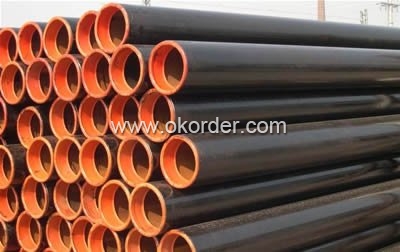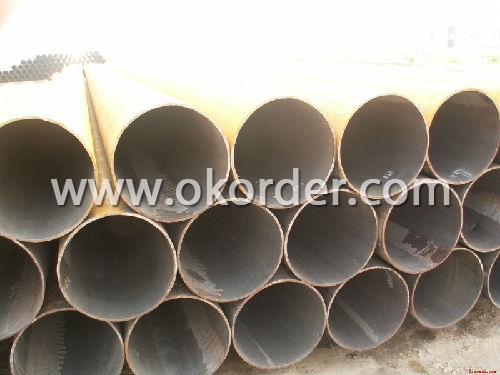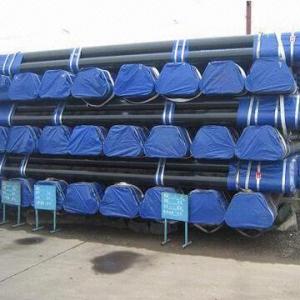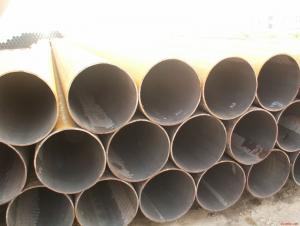Seamless Steel Tubes For Petroleum Cracking
- Loading Port:
- China Main Port
- Payment Terms:
- TT or LC
- Min Order Qty:
- 20mt m.t.
- Supply Capability:
- 5000 Tons Per Month m.t./month
OKorder Service Pledge
OKorder Financial Service
You Might Also Like
Standards and Application of Seamless Steel Tubes For Petroleum Cracking
DIN2391:Seamless Precision Steel Tubes for mechanical and automotive engineering.
EN10305-1:Seamless Steel Tubes for precision applications.
DIN17175:Seamless Tubes of Heat resistant Steels used in Boilers, Pressure vessels & equipment for service upto 600° C and at high pressures.
ASTM A106/SA106:Seamless Carbon Steel Pipes for High - Temperature Service.
ASTM A179/SA179:Seamless Cold-Drawn Low-Carbon Steel tubes for Heat-Exchanger and Condenser.
ASTM A192/SA192:Seamless Carbon Steel Boiler Tubes for High-Pressure Service.
ASTM A210/SA210:Seamless Medium-Carbon Steel Tubes for Boiler and Super heater.
Request a Supplier Assessment Report of Seamless Steel Tubes For Petroleum Cracking
You can either send the default request below or compose your own request to the supplier.
Usages of Seamless Steel Tubes For Petroleum Cracking
It can be used for transmitting a large number of fluid. Such as oil, natural gas, water and some solid materials. At the same time it can be widely used as the manufacture of various structural parts and mechanical parts,as well as building construction.
Package of Seamless Steel Tubes For Petroleum Cracking
Packaging/Delivery Wrapped in bundles with steel strips or according to customers' requirements.


- Q:What is the role of steel pipes in the construction of bridges and tunnels?
- Steel pipes play a crucial role in the construction of bridges and tunnels. They are extensively used for various purposes due to their strength, durability, and versatility. In bridge construction, steel pipes are commonly employed for the fabrication of the bridge's structural framework. They serve as the primary load-bearing members, providing support and stability to the entire structure. Steel pipes are particularly favored in bridge construction due to their high tensile strength, which enables them to withstand heavy loads, including the weight of vehicles and the dynamic forces generated by traffic. Steel pipes are also utilized in the construction of bridge piers and abutments. These components provide the foundation and support for the bridge structure. Steel pipes are often driven deep into the ground to create sturdy foundations that can withstand the forces exerted by the bridge's weight and external factors such as wind, water currents, and seismic activity. Similarly, steel pipes are essential in tunnel construction. They are extensively used in tunnel lining, which refers to the installation of structural elements along the tunnel walls and roof to provide stability and prevent soil or rock collapse. Steel pipes are often used as reinforcement elements, ensuring the structural integrity of the tunnel and protecting it from external pressures. Moreover, steel pipes are employed for underground utility systems in both bridges and tunnels. They serve as conduits for various utilities such as water supply, electrical cables, gas pipelines, and communication lines. Steel pipes are ideal for these applications due to their corrosion resistance, ability to withstand high pressures, and longevity. Overall, the role of steel pipes in the construction of bridges and tunnels is to provide strength, stability, and durability to the structures. They play a vital role in ensuring the safety and functionality of these critical infrastructure projects, allowing for efficient transportation and the seamless provision of utilities.
- Q:What is the maximum temperature and pressure that steel pipes can withstand?
- The maximum temperature and pressure that steel pipes can withstand depend on various factors such as the grade of steel, wall thickness, and intended application. However, in general, steel pipes can typically withstand temperatures up to 1000-1200°C (1800-2200°F) and pressures ranging from 1000-5000 psi (6.9-34.5 MPa). It is important to consult specific industry standards and engineering guidelines for accurate information based on the specific steel grade and application.
- Q:What is the fatigue strength of steel pipes?
- The fatigue strength of steel pipes refers to the maximum stress level that the pipes can endure without experiencing fatigue failure or damage over a given number of stress cycles. It varies depending on factors such as the steel composition, manufacturing process, pipe dimensions, and environmental conditions.
- Q:Can steel pipes be used for hydropower systems?
- Hydropower systems can indeed utilize steel pipes. For a variety of purposes in these systems, steel pipes are commonly employed, particularly for penstocks, which facilitate the transportation of water from a reservoir to a turbine. The strength, durability, and capacity to withstand high pressure and water flow make steel pipes a preferred option. Additionally, their resistance to corrosion ensures their suitability for long-term usage in hydropower systems. Moreover, the ease of welding or joining steel pipes enables flexibility in system design and installation. In summary, steel pipes are a dependable and extensively utilized alternative for hydropower systems.
- Q:How are steel pipes protected against mechanical impact?
- Steel pipes are protected against mechanical impact through various methods such as adding protective coatings, using steel pipe supports and clamps, or installing protective barriers to absorb and distribute impact forces.
- Q:Galvanized steel pipe, PPR pipe, PE pipe, U-PVC pipe and HDPE double wall corrugated pipe and what is the difference between the characteristics of
- U-PVC tubes are hard poly vinyl pipes, because they contain chlorine, so they are mainly used in sewer pipes or electrical wiring;HDPE double wall corrugated pipe is a high-density polyethylene pipe, because of its excellent electrical insulation performance, now mainly used for distribution line arrangement.
- Q:What is the role of steel pipes in the food processing industry?
- Steel pipes play a crucial role in the food processing industry as they are used to transport various liquids, gases, and solid materials. They provide a safe and hygienic means of transferring ingredients, such as water, oils, and food products, from one processing stage to another. Steel pipes are resistant to corrosion and can withstand high temperatures, making them suitable for food processing environments. They also ensure the integrity and quality of the food by preventing contamination and maintaining proper sanitation standards.
- Q:The difference between 12Cr1MoVG alloy steel tube and 15CrMo
- 15CrMo is a steel Pearlite Heat-resistant steel, has high heat resistance at high temperature (b = 440MPa) and antioxidant activity, and has certain ability of anti hydrogen corrosion. Because of the high content of Cr, C and other alloy elements in steel, the tendency of hardening of steel is obvious, and the weldability is poor.
- Q:How are steel pipes measured and specified?
- Steel pipes are measured and specified based on their diameter (nominal pipe size or NPS) and wall thickness (schedule or SCH). The NPS represents the internal diameter of the pipe, while the SCH indicates the thickness of the pipe walls. These measurements are crucial for ensuring proper compatibility and functionality in various applications, such as plumbing, construction, and industrial processes.
- Q:Can steel pipes be used for underground electrical conduits?
- Yes, steel pipes can be used for underground electrical conduits.
1. Manufacturer Overview |
|
|---|---|
| Location | Wuxi, China |
| Year Established | 1991 |
| Annual Output Value | 300,000Tons |
| Main Markets | Europe; Southeast Asia; etc. |
| Company Certifications | API 5L;API 5CT;API Q1;ISO/TS29001 |
2. Manufacturer Certificates |
|
|---|---|
| a) Certification Name | |
| Range | |
| Reference | |
| Validity Period | |
3. Manufacturer Capability |
|
|---|---|
| a)Trade Capacity | |
| Nearest Port | Wuxi; Shanghai |
| Export Percentage | 41% - 50% |
| No.of Employees in Trade Department | 3900-4000 People |
| Language Spoken: | English; Chinese; Spanish |
| b)Factory Information | |
| Factory Size: | Above 450,000 square meters |
| No. of Production Lines | Above 10 |
| Contract Manufacturing | OEM Service Offered;Design Service Offered |
| Product Price Range | Average |
Send your message to us
Seamless Steel Tubes For Petroleum Cracking
- Loading Port:
- China Main Port
- Payment Terms:
- TT or LC
- Min Order Qty:
- 20mt m.t.
- Supply Capability:
- 5000 Tons Per Month m.t./month
OKorder Service Pledge
OKorder Financial Service
Similar products
New products
Hot products
Related keywords






























